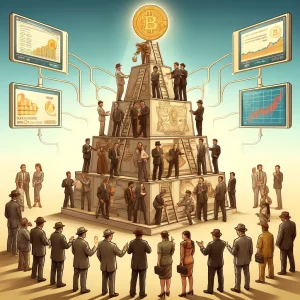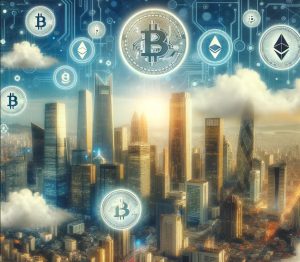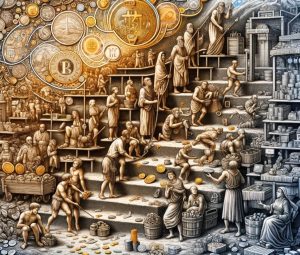Blockchain Games and NFTs – Curse or Blessing?
5 min readTable of Contents
The NFT hype has made many rich. In the Philippines, the NFT game Axie Infinity has even sparked a crypto boom. With thousands left unemployed by the coronavirus pandemic, many Filipinos have started playing blockchain games to keep themselves afloat. But there are also negative reactions to NFTs. There has been heavy criticism, especially from the Western gaming world.
For example, when the game developer Ubisoft announced last November that it would integrate NFTs into its games, YouTube, Reddit and Co. were flooded with a torrent of rejection. A look at the NFT trading platform Rarible also shows that the NFT collection from Ubisoft was only sold 35 times in the entire month of February 2022 – a sign of the gaming community’s low interest in NFTs.
Many gamers seem to think that NFTs are just another way for publishers to make a quick buck – at their own expense.
What bothers gamers about NFTs?
It is precisely this increasing commercialization of their favorite hobby that is the main concern of the gaming community for NFTs. Are non-fungible tokens in the gaming sector really just the further development of the greed for profit of EA and Co., which began with microtransactions and loot boxes? What really differentiates so-called play-and-earn games like Axie Infinity, Splinterlands or Thetan Arena from traditional games like World of Warcraft, Minecraft or Call of Duty?
The opposing side argues that unlike traditional games, where the amount of money and in-game items are under the developers’ control, games based on blockchain technology allow players to create their own assets, own them fully and freely use them at any time trade between the crypto and fiat worlds on their own terms.
The benefits of play-to-earn and NFTs in blockchain games
These are exactly the reasons why the blockchain could herald a new era of gaming, they say. Games would evolve away from a centrally planned, “do what we let you do” economy to a “anything can be traded with anyone, anytime” capitalist economy. For avid gamers, this would mean that they could be rewarded for their time and effort, for example by selling or lending rare items to other players who have less time invested in a game.
Everything would be documented on blockchains. It should be possible for everyone to understand at any time how rare certain gaming items really are, what benefits they bring and at what prices they have been traded in the past. The blockchain could thus create the foundations of any functioning economy in gaming worlds through security and trust. In the future, it could prevent game studios from making arbitrary decisions that could cause certain skins or items to become meaningless and worthless overnight.
But of course this also brings certain risks and makes it understandable why players are skeptical about NFTs and blockchain technology. Because games have always been one thing above all: a way for people to escape the monotony and stress of normal everyday life.
Precisely because in many games everyone is equal before the game developers, gamers do not want to integrate a market economy into games. In addition, some gamers see the fairness in games threatened by a blockchain-based in-game economy. In a gaming world where players can buy resources with money (e.g. NFT characters in Axie Infinity or Thetan Arena), this could allow some players to progress through the game without investing a lot of time.
While the majority of gamers tolerate purchases of aesthetic upgrades for game items or characters, they often get annoyed when money can buy tangible gameplay benefits.
Why NFTs could still make sense in gaming
But is it really true that the commercialization of gaming through blockchain technology and NFTs generally makes games worse?
Hatred of NFTs in games tends to come from passionate gamers rather than casual gamers who make up the majority of gamers. Data from the company Newzoo shows that casual gamers who play on mobile devices now make up more than 55 percent of all gamers. In addition, the sales figures speak a clear language. Mobile gaming revenue now accounts for more than half (52%) of the entire industry, while PC gamers account for 20% and console gamers for 28%.
For many players, these developments don’t seem to be a bad thing. That might come as a shock to some, especially older gamers, but the numbers don’t lie. The market of casual gamers who can’t tell a “good” game from a “bad” one and squander their money on games like Clash of Clans or Clash Royal is growing rapidly and it doesn’t seem unlikely that many of these players will in the future play their games Could also put money into NFTs.
The beauty of free markets, however, is that it doesn’t mean that older game models will disappear altogether, but rather that a new game category will expand the gaming world.
A Report by blockchain analysis company DappRadar shows that blockchain games already have several million users and were responsible for over 22 percent of the volume of all traded NFTs in the third quarter of 2021 alone. While the play-to-earn model is still in its infancy, it appears to have passed the market test.
Play-to-earn revolutionizes gaming?
NFTs and blockchain technology are expanding the ways gamers can make money if they want to. Until now, few of us have been able to monetize our time invested in games through live streaming on Twitch, with YouTube videos, or by participating in tournaments and product sponsorships.
Gaming with NFTs could change that. According to the theory, objects acquired in games could be traded directly with others and could theoretically be exchanged for other cryptocurrencies or fiat currencies at any time. Even at the lowest level, it is possible for even casual players to earn money in mobile NFT games such as Thetan Arena or Splinterlands.
In addition, the tokenization of skins, game worlds or game objects could give artists and game modders the opportunity to sell their builds in Minecraft or their game modes in Half Life to their fans. Blockchain games promise to unlock all of these earning opportunities – and more.
Conclusion
For many years, Microsoft enforced intellectual property laws that allowed Minecraft users to modify and create user-generated content, but prohibited them from selling it for their own profits.
Gamers are rightly concerned about how blockchains will transform their cherished worlds. But the passion of many hardcore gamers, coupled with a gross misunderstanding of blockchains, has led them to end up defending the only true dictatorship of profit maximization, namely that of the big game studios.
Blockchains offer a way to legitimize gaming economies and engage the majority of gamers in the wealth-building process. Not just developers, not just streamers or e-athletes, but everyone. Change will come with risks, but change always opens up opportunities that can benefit us all.
Learn how to create NFTs on the Avalanche network and sell them on Shopify






